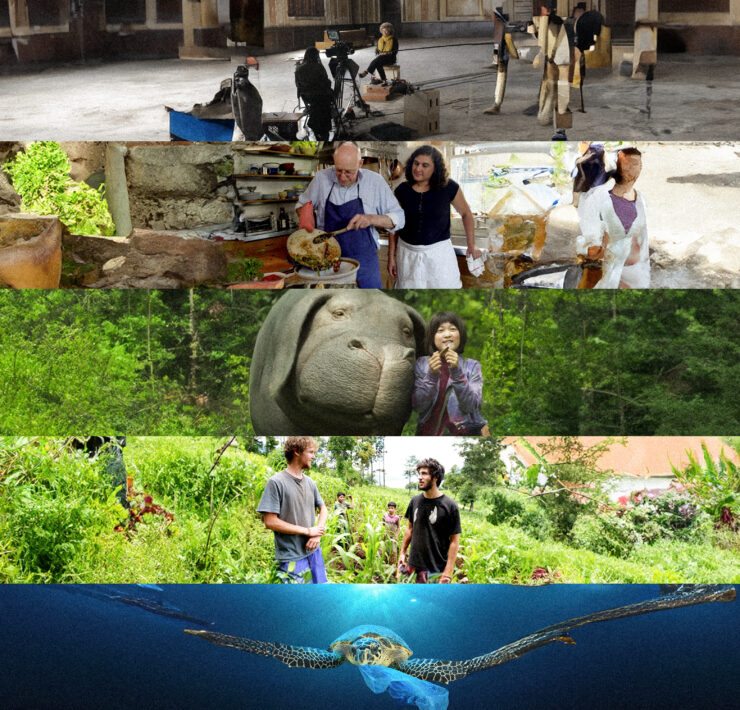Editor’s Note: The following piece is a thematic analysis of No Country for Old Men, not a review. As such, it contains numerous spoilers. If you have not seen the film, please read at your own risk.
Few people at this point need to be convinced of the genius behind the Coen brothers’ latest film, the adaptation of Cormac McCarthy’s novel No Country for Old Men. The film was heaped with critical praise, and took home Best Picture and Director honors at the Academy Awards. So, to review the movie after it has already received so much press seems a bit redundant at this point. However, there are deep, underlying themes in the film that deserve to be explored.
The premise of the movie is simple and visceral. Blue-collar Texan Llewelyn Moss (Josh Brolin) stumbles upon the scene of a shootout while hunting in the desert. Amongst the carnage, he finds a suitcase containing more than $2 Million. He is soon hunted by a hired gun, the sinister and apparently heartless Anton Chigurh (Javier Bardem) who seems to take sick pleasure in killing. Meanwhile, small-town sheriff Ed Tom Bell (Tommy Lee Jones) tries to bring Chigurh’s rampage to an end, while simultaneously trying to find and protect Moss. All of it amounts to an archetypical struggle between good and evil. However, it’s the film’s treatment of good and evil that sets it apart.
The force of good in the film often seems incapable of enacting change. Moss ends up in his situation because he decides to bring a dying man water, returning to the scene of the shootout just as it’s being investigated by druglords. Sheriff Bell ruminates throughout the movie about the deteriorating state of the world, and his utter incomprehension of the evil he’s facing.
Evil, by comparison, is a relentless force in the film. Chigurh seems freakishly prescient about Moss’ movements. No matter where Moss runs, or how well-laid his plans are, Chigurh is on his heels. Moreover, evil consistently outpaces good in the movie. While Chigurh manages to stay about half a step behind Moss, he’s always a step ahead of Sheriff Bell. In the end, Chigurh’s relentlessness pays off. He retrieves his money and never so much as comes face-to-face with Bell.
Throughout the film, Chigurh sees himself as the agent of fate. He absolves himself of any wrongdoing because, according to his worldview, the future has been predetermined. He is merely carrying out the inevitable. At first glance, it seems that Chigurh’s reckless worldview is never challenged, and that he walks away the unmitigated victor. However, upon closer inspection, Chigurh does receive his own harsh dose of reality. When his car is t-boned at an intersection, Chigurh becomes the victim of a fate beyond his control, rather than the instrument of fate he sees himself as.
Overall, No Country for Old Men seems to present a very grim outlook. Good is worn into exhaustion by the sheer persistence of evil. Chigurh has triumphed. Moss is dead. Sheriff Bell has been so demoralized by the situation that he has chosen to retire. Yet, as with most McCarthy works, there is a faint glimmer of hope. In Sheriff Bell’s final speech, he tells his wife of a dream he had. In the dream, Bell is riding a horse alongside his deceased father. Bell’s father carries with him a horn containing an ember. As Bell describes the dream to his wife, he tells of how his father rode ahead of him to start a fire, carrying the light with him through the cold and the dark. McCarthy fans will find this a familiar theme from his work. In his most recent novel, The Road, a father and son travel through a post-apocalyptic wasteland, trying to elude roving marauders who seem to have descended to a subhuman state. Throughout the book, McCarthy makes reference to the flashlight that the father and son carry, and that they are charged with “carrying the light.” The implication—in The Road as well as No Country for Old Men—is that the forces of good, however outnumbered by the darkness that surrounds them, are responsible for keeping alive the spark of humanity and compassion. This seems to be Bell’s ultimate realization. Though the end of the film seems to find him in a state of tired resignation, he has concluded that the fight against evil is worthwhile, even when daunting. In the midst of the dark and the cold, the fire of human goodness must still be carried.
This mirrors the situation we often find ourselves in. The pervasiveness of evil in the world can break our spirits. When we look around at injustices like extreme poverty, sex slavery, brutal warfare or child labor, the task seems insurmountable. For every one injustice we try to fight, many more crop up. Yet, it is our task to carry the spark of humanity—and, moreover, the light of Christ—even when evil seems tireless.




















